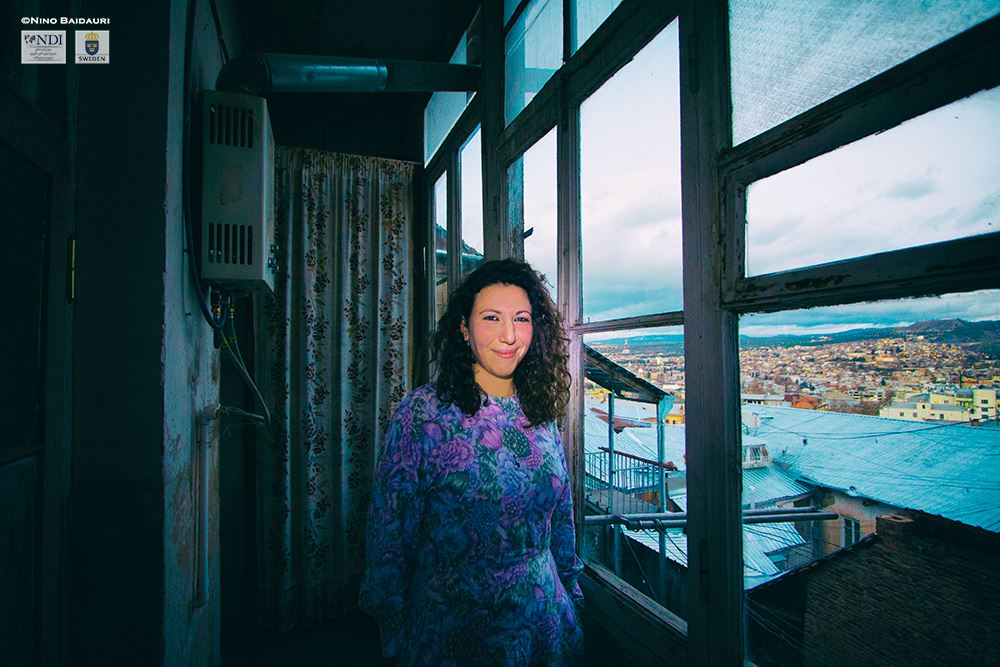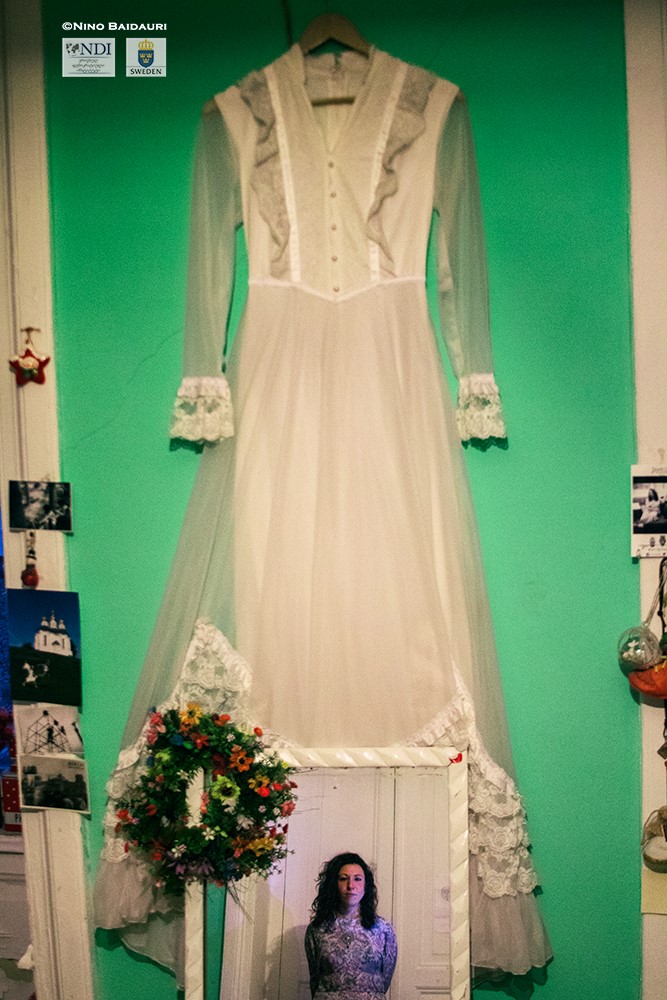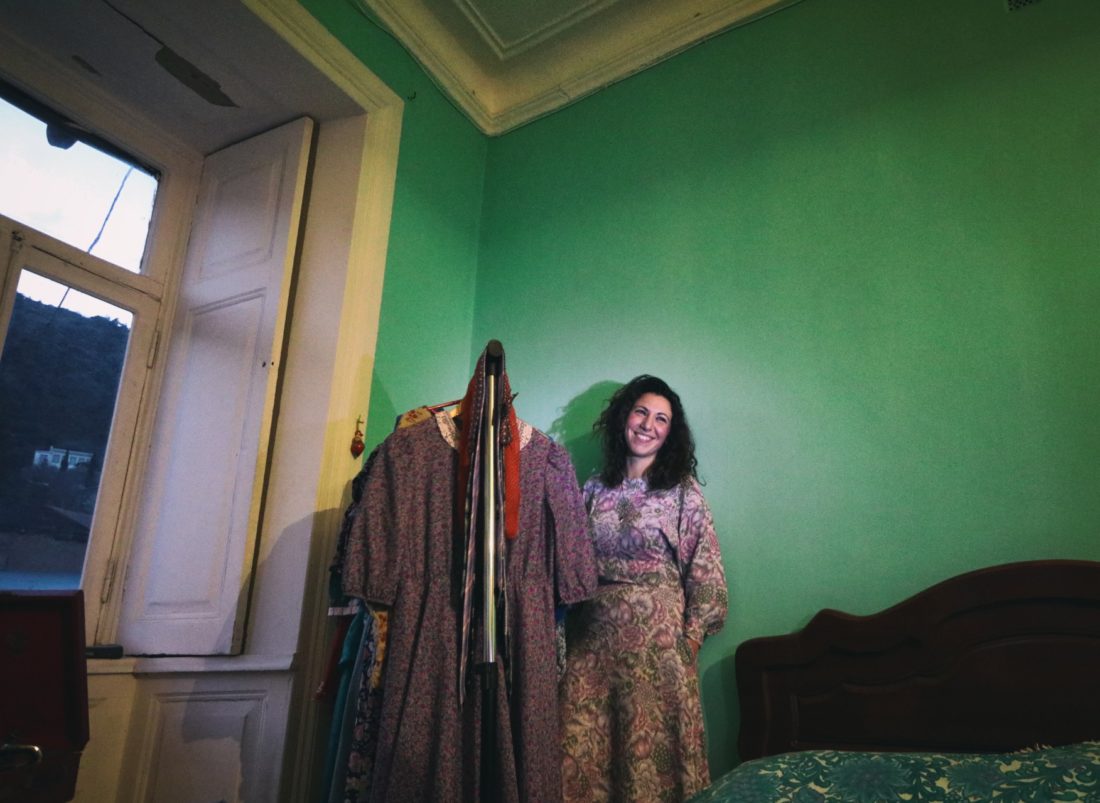Dina Oganova, 28, Tbilisi
„My mother and I spent all summer holidays in Borjomi in my childhood. Most of the time we rented the house of one and the same photographer, who worked and took pictures in the Borjomi Park. I was allowed to do anything in this house, except for entering one room. I was strictly prohibited to enter this room. This room always shone and a beam of red light flickered out of it. I used to sit for hours at the entrance waiting for the photographer to come out to get a chance to catch a glimpse of at least something inside. He gave me leftover photo paper after printing pictures to play with. I was extremely happy, „look, so important thing has happened in my life…“. He saw all the time that I sat, waited and was curious. I was about 4-5 years old when I visited Borjomi last time. I have not been there since then. On the day we were leaving that man came to me and told me, “Come, I will take you there”. I will never forget this moment in my life because I saw images appearing on the paper, which hugely impressed me. This was a rather impressive phenomenon for me. He gave me a small camera before we left for Tbilisi.
This was the period of unrest, the 90s, the camera was lost and has never been found since. I wished to become a stage director at school but as it often happens in Georgia, you are supposed to become either an economist or a lawyer… This was the “frame” my family forced on me. Whenever I said that I wanted to enroll at the Theatrical Institute I got the following answer, “Only harlots study at the Theatrical Institute“. There was such an approach, was not there?
 To put it short, I did not want to become an economist or a lawyer. When I finished school, I decided to leave for Saint-Petersburg since my grandfather lived there. I am the only child in the family. My father is no longer alive and there are only women around me – my mother, grandmother, two aunts and my cousin. As I was the youngest in the family I was coddled by all family members. I told my grandfather that I had decided to live with him because I would not be able to become an economist or a lawyer. I had known since my childhood that after finishing school I would leave Georgia. I did not have any alternative thought. By grandfather accepted me rather warmly and I planned that I would take private lessons and would study in Moscow. These were my dreams and plans but suddenly my grandfather died and I had to come back to Georgia.
To put it short, I did not want to become an economist or a lawyer. When I finished school, I decided to leave for Saint-Petersburg since my grandfather lived there. I am the only child in the family. My father is no longer alive and there are only women around me – my mother, grandmother, two aunts and my cousin. As I was the youngest in the family I was coddled by all family members. I told my grandfather that I had decided to live with him because I would not be able to become an economist or a lawyer. I had known since my childhood that after finishing school I would leave Georgia. I did not have any alternative thought. By grandfather accepted me rather warmly and I planned that I would take private lessons and would study in Moscow. These were my dreams and plans but suddenly my grandfather died and I had to come back to Georgia.
My mom insisted on my staying in Georgia, saying “We do not have anyone but you, where should you go?!…“ etc. So I stayed here. I had to study, I knew that, so I enrolled at the Department of Economics anyway.
I started taking photos when I was a first-year student. I took pictures by my small “milnitsa” camera and then printed photos because I was curious to see what I had taken. I remember it was 15 May, my mom’s birthday, I invited her to the theater. I was late because I was printing photos. When I came to the theatre I went directly to my mom, saying, “Mom, see, I have printed some photos”. A man sitting next to me asked me, “May I see your pictures?“ I replied, „Of course!“ Seeing my pictures he gave me his business card and said, “I will be waiting for you on Thursday at 5 p.m.” He stood up and went away. After the play was over I looked at the name on the card – “Yuri Mechitov”.
We were rather badly off in that period. I told my mom I would go off my mind unless she took me there… „You have ruined my life by forcing me to study economics…“ etc. My mother agreed and on Thursday at 5 p.m. we came to the appointment. I had to pay USD 100 to study photography at Yuri Mechitov, which was a lot of money for us in that period. My mother told him that although she was rather grateful she could not afford that. Yuri asked her to leave me there on that day. There were four of us in the group. He asked each of us why we wanted to study photography. I answered right away that I wanted photography to be my profession. He told me, „It will be“.
My first assignment was to take my friend’s portrait. I told him „thank you very much but I do not even have a camera“. He took Zenit camera from the cabinet, handed it over to me and insisted that I come back. I had lessons on Mondays and Thursdays but our group broke up exactly in one month. I was the only person left in the group. As Yuri had to go to photo sessions every day I accompanied him and did not have to go to the studio any more. I already know at my third and fourth year of studying at the university that I would never become an economist and that I was a future photographer.
 Then I realized and I understand now that it was a right decision to return to Georgia. I am so happy now. I say all the time that Georgia is the country I love very much not because I was born and grew up in this country but because everything seems different to me here. Take photography, for example. There is no country better for taking pictures and implementing my projects than Georgia.
Then I realized and I understand now that it was a right decision to return to Georgia. I am so happy now. I say all the time that Georgia is the country I love very much not because I was born and grew up in this country but because everything seems different to me here. Take photography, for example. There is no country better for taking pictures and implementing my projects than Georgia.
Moreover, it is rather pleasing, when you are paid for what you like doing most. I say that I never work. I consider reading lectures on photojournalism at GIPA as my job but I never think about taking pictures in this way. I find it rather pleasurable to decide myself whom to sell my photo. For example, I know to whom to give my book, there are 87 of them. This book „My Space“ is about Georgia’s new generation – the first generation of people who were born and started living in independent Georgia following the fall of the Soviet Union.
I face problems as a photographer at religious holidays, when they tell me flatly: „You cannot go this way because you are a woman, this is men’s way…“. I answer that „I am a photographer, not a woman and I have to take pictures!“ And then the argument arises. I remember, Natela Grigalashvili, Zura Kurtsikidze and I were together at one of the religious festivals in Pshavi. I was observing the road, which seemed more interesting to me, where males were walking together dragging a lamb along. I made a step forward and heard shouting “We will leave if you come “. This happens because you are a woman. In this particular case I am not a woman I am a photographer. Zura followed the men, while Natela and I stayed with women, who were waiting for men to finish feasting, praying at the church and having fun. They were waiting for so long to take drunk men home, although they were not allowed even to approach the church. I had traveled so long road to take photos at the religious festival but ended up doing nothing for 6 hours. I cannot put up with such restrictions.
However, I am interested in taking photos of women most because women in Georgia have a lot of problems. The book I am working on currently is about kidnapped women. I heard during my childhood all the time about bride kidnapping of some girl. Infringement of rights in this way seems unimaginable to me. I am not sure people will think about this topic and whether those people, whom this message is addressed to, will see this book. But I am doing this project in the first place for me because I have been so concerned about this subject that I want to speak out and say that facts of bride kidnapping have actually taken place.”

